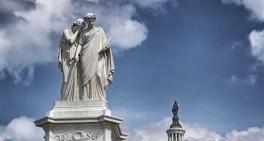Brazil's top court: Lula can be jailed for upheld conviction
Notable Attorneys
A sharply divided top court voted early Thursday to reject an attempt by former Brazilian President Luiz Inacio da Silva to stay out of jail while he appeals a corruption conviction, delivering a hard blow to the front-running candidate in this year's presidential election in Latin America's largest nation.
After nearly 11 hours of often heated debate, the Supreme Federal Tribunal voted 6-5 to deny da Silva's request to stave off a 12-year prison sentence while he fights a conviction that he has always argued was nothing more than a ploy to keep him off of the October ballot.
Despite the conviction and several other corruption charges against him, da Silva leads all preference polls for the election.
The decision means that da Silva will likely be jailed soon, though probably not until at least next week thanks to various technicalities.
Chief Justice Carmen Lucia, who was sharply criticized during the session by various colleagues, cast the deciding vote after the court was tied at 5 to 5.
"The constitution secures individual rights, which are fundamental to democracy, but it also assures the exercise of criminal law," she said.
The debate at the Supreme Federal Tribunal underscored how fraught the matter is at a time of high tension and angst in Brazil.
Justice Gilmar Mendes, traditionally a critic of da Silva, voted in favor of da Silva's petition to stay out of jail, challenging his colleagues to buck pressure from society.
"If a court bows (to pressure), it might as well not exist," said Mendes.
Justice Luis Roberto Barroso argued that the integrity of the justice system was at stake.
"A penal system that doesn't work with minimal effectiveness leads to an instinct for taking justice into one's own hands," Barroso said in voting against da Silva.
Related listings
-
Congressional Dems take Trump to court over foreign favors
Notable Attorneys 06/05/2018Lawyers representing nearly 200 Democrats in Congress plan to argue in federal court Thursday that President Donald Trump is violating the Constitution by accepting foreign state favors without first seeking congressional approval.The case argues tha...
-
Justices allow Arkansas to enforce abortion restrictions
Notable Attorneys 05/26/2018The Supreme Court is allowing Arkansas to put in effect restrictions on how abortion pills are administered. Critics of a challenged state law say it could effectively end medication abortions in the state.The justices did not comment Tuesday in reje...
-
Retailers hope for certainty as Supreme Court hears tax case
Notable Attorneys 03/30/2018Retailers are hoping for a resolution this year from the Supreme Court, which hears arguments Tuesday in a decades-old dispute: Whether companies must collect sales tax on items sold in a state where they don't have a store or other building.If the c...

USCIS Will Begin Accepting CW-1 Petitions for Fiscal Year 2019
On April 2, 2018, U.S. Citizenship and Immigration Services (USCIS) will begin accepting petitions under the Commonwealth of the Northern Mariana Islands (CNMI)-Only Transitional Worker (CW-1) program subject to the fiscal year (FY) 2019 cap. Employers in the CNMI use the CW-1 program to employ foreign workers who are ineligible for other nonimmigrant worker categories. The cap for CW-1 visas for FY 2019 is 4,999.
For the FY 2019 cap, USCIS encourages employers to file a petition for a CW-1 nonimmigrant worker up to six months in advance of the proposed start date of employment and as early as possible within that timeframe. USCIS will reject a petition if it is filed more than six months in advance. An extension petition may request a start date of Oct. 1, 2018, even if that worker’s current status will not expire by that date.
Since USCIS expects to receive more petitions than the number of CW-1 visas available for FY 2019, USCIS may conduct a lottery to randomly select petitions and associated beneficiaries so that the cap is not exceeded. The lottery would give employers the fairest opportunity to request workers, particularly with the possibility of mail delays from the CNMI.
USCIS will count the total number of beneficiaries in the petitions received after 10 business days to determine if a lottery is needed. If the cap is met after those initial 10 days, a lottery may still need to be conducted with only the petitions received on the last day before the cap was met. USCIS will announce when the cap is met and whether a lottery has been conducted.




